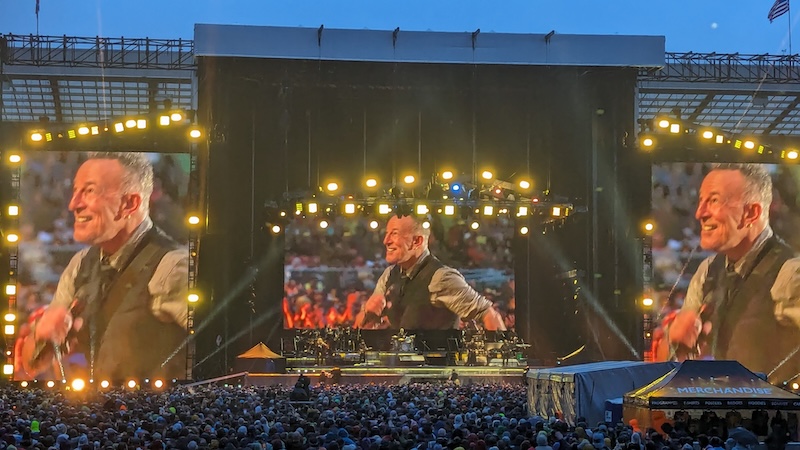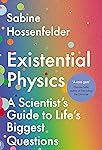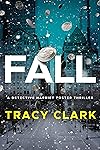May '24 Monthly Review
This is the fifth post of my series of monthly review posts for 2024. Other entries in the series:
Ah, May, the month of my birthday - and Eurovision! I'm 35 now, which feels weird (especially if I do the maths regarding how old I was when my parents were my current age - a mental exercise I wholeheartedly do not recommend). Perhaps this is an effect of the pandemic memory-holing a couple of years out of our collective consciousness, but I feel like I've gone from my late-twenties to mid-thirties in the blink of an eye. Or maybe this is what happens when you get older?
Home
My wife and I have spent a lot of time in the garden, now that the weather is getting nice again. We moved house late last year. The house is lovely. The garden was 'low maintenance' of the gravel and artificial turf variety. We've removed one strip of the gravel, put down some fresh soil and sowed wildflower and clover. So many bags of rubble! The plan is to let this stretch of the garden grow wild and return it to nature. It's also a bit of practice, if this takes well then next year we'll pull up the artificial grass and sow a clover lawn - which is much better for the environment.
Work
Work towards the sale of the Bank continues. I've spent a lot of time this month looking over processes, controls and patterns. A few days ago I travelled up to the Edinburgh office for my first PI Planning session with the new teams, which was a fun experience. In the principal role I try very hard to let the teams run themselves, not treading on the toes of any of the leads, but making sure I'm present for any issues that arise. What tends to happen is that I end up shifting my attention and focusing on one platform at a time (I described it as like the Eye of Sauron, but of course not with evil intent!) - so last month there was a big focus on containers as a tenant needed some assistance. More recently it's been AWS with the rollout of our cloud-native AWS Backup capabilities across the estate. It looks like next I'll be focusing a little deeper down out networking stack, in terms of our proxy, ingress and egress traffic. There's a difficult balance to strike between going deep on a subject and staying high-level - which I don't think I've got quite right. On reflection I have a tendency to deep delve into a subject, which sets me up better in the long-term but slows me down in the short-term. Perhaps there's a time and a place, but early on in the role I want to get the fundamentals right, so that I can shape it.
Springsteen!
Last time Bruce Springsteen came to the North East I missed out on tickets. It was not a mistake I was willing to make twice. My stepfather-in-law and I made the trip to Sunderland's Stadium of Light to see The Boss. To put it colloquially, it was absolutely hoying it down with rain, but to some extent the weather made the event. There was a slight delay in proceedings as adjustments and accommodations were made to handle the apocalyptic-level downpour. As soon as Springsteen and the E Street Band kicked off with 'Waitin' On A Sunny Day' the mood was instantly lifted. The rain became a character in the performance. On this tour, Springsteen has tinkered with the early half of the setlist - I really liked how this gave the band the flexibility to lean in to the weather or audience requests (like they did in Dublin with 'Santa Claus is Coming to Town'!).
Honestly, I cannot imagine being 74 years old and performing a three-hour set in the pissing rain of Sunderland, but the Bard of Asbury Park did not disappoint. I can't say this any other way - when I listen to Springsteen, I feel different. The music balances uplifting, life-affirming unadulterated joy with the mournful, the despair and the hope. Perhaps it's the location? The North East is an industrial heartland, and as explored in Fiona Hill's autobiography "There is Nothing For You Here", there are strong cultural parallels and connections to the Rust Belt and Midwest America. Springsteen singing 'The River' on the banks of the Wear hits differently. At points, the storytelling brought me to tears and the entire stadium to stunned, respectful silence. Jake Clemons playing the solos of his late uncle Clarence Clemons, a.k.a "The Big Man" alongside a fitting tribute was something special.

Finishing on a positive, the extended encore was the perfect way to send everyone home on a high - from the thrice-extended 'Badlands', 'Born to Run' and the finale: an acoustic, wistful rendition of 'I'll See You In My Dreams'. I also loved how Springsteen thanked every performer individually as they left the stage. A small, but respectful touch, given how hard every musician worked on the night.
Check out the full setlist - it also looks like a live recording of this set is available. This concert is one of the more unforgettable experiences in my life and I'm truly grateful I had the opportunity to enjoy the music live.
Side Project: Pick'Em App
I finally got round to blogging about how I created the Pick'Em application UI as promised, alongside an additional piece on running a scheduled lambda for marking events as broadcasted. As it stands, it's pretty much done as a hobby project, it'll run inexpensively for the forseeable. There's potential to open it up to the wider public, however this would require a more involved engineering effort and I'm not particularly sure it's what I want to do right now. Since writing those posts I've added a few pieces of small functionality, like a user profile and settings section. As a bit of a laugh I'm thinking about how to add trophies/achievements.
Books
Existential Physics: A Scientist's Guide to Life's Biggest Questions by Sabine Hossenfelder

Existential Physics is structured as a series of questions, interspersed with interviews with prominent figures. Questions such as "does the past still exist?" and "has physics ruled out free will?". The book draws a distinction between the scientific, the unscientific and the _a_scientific, the difference being: things that have been proven to be true, things that have been proven not to be true, and things that cannot be proven either way. The intersection of science and philosophy lives in the latter, in our sense to make meaning of the world. The book explores, in a conversational and collegiate manner, how far science can take us in this big questions and what still remains.
A great quote from this book:
quantum mechanics is the prime example for what can go wrong with using intuitive language for abstract math.
Fall by Tracy Clark

The sequel to Hide in the Detective Harriet Foster series sees the titular character and partner Detective Lee investigate a series of deaths of city aldermen. I enjoyed the story, which develops at a nice pace. Remarkably, the main story thread itself is fairly run-of-the-mill and somewhat predictable. The strong character work and far superior, albeit more mysterious secondary plot (the mystery caller) adds a lot more to the story, giving purpose and tension.
Strong Female Character by Fern Brady

Brady writes with astonishing honesty about her life growing up as an undiagnosed autistic woman. It is a tough read, Brady has not had an easy life and details homelessness, domestic violence, institutionalization, grooming, run-ins with the law, stripping and exploring her sexuality. All this is done through the lens of autism - the story is of the author understanding herself, particularly, seeking an answer to the question "why do I smash my furniture"? So much content about autism is written from the perspective on an observer. This book seeks to redress that balance. I think this is a necessary read.
The Coming Wave: Technology, Power, and the Twenty-first Century's Greatest Dilemma by Mustafa Suleyman and Michael Bhaskar

I listened to the audiobook (read by Mustafa Suleyman) while out running rather than read the text - this may colour my perspective somewhat. The book content is delivered with an unrelenting sense of inevitability, laden with superlatives about exponential growth, Great Dilemmas and The Coming Wave. This is coming from an insider, now the CEO of Microsoft AI. In many respects AI has been the latest technological bandwagon, with everyone and their dog trying to integrate 'AI' into their systems. The inevitability, perhaps, is that all that hardware wasted on NFTs is now being repurposed to run LLMs. The core premise of 'The Coming Wave' is that the ongoing technological developments of AI and synthetic biology will only quicken, becoming cheaper and more portable. Examples of this are, for example, how easy it would be for anyone to develop their own biological weapons, or their own weapons highly optimized for specific aims. These are coloured with examples of where we are now - viruses escaping secure laboratory conditions, police drones in hostage situations - and adds the "this but faster and cheaper" argument. I also feel that the author struggles on the arguments around regulation and containment. In short, regulation is important but not alone sufficient (not that anyone actually suggests it was sufficient alone) and that it is probably already too late for containment, and even so, remember "this but faster a cheaper" argument. I don't want to get into the debate about whether LLMs and DALL-Es are parlour tricks, or whether AI is a marketing term. There are use cases for this stuff, there are legitimate ethical grievances around the technology's use. Let's think about copyrighted works being fed in as input - are the outputs therefore derivative? Perhaps I just wanted more from this book than Fear, Uncertainty and Doubt.
Sunbringer by Hannah Kaner

Sunbringer is the recently-released sequel to Godkiller, in which the king with a God for a heart declares himself a God. Unfortunately, I didn't enjoy this as much as its predecessor. Kissen, ostensibly the main character seemingly left-for-dead in book one, isn't featured as heavily, is mostly separate from the action and doesn't do much of significance. Most improved is the character of Inara, who grows in confidence and in power with her abilities as she learns more about her origins. The first half of the book is a slog because of the separation, however the pace picks up near the end leading to a thrilling finale.
Other Media
Alright, time to talk about Eurovision. This year had everything - classic Eurovision wackiness, controversy, not-political-but-really-political acts.
My favourite five finalists, in no particular order, were:
- Croatia 🇭🇷
- Israel 🇮🇱
- Latvia 🇱🇻
- Switzerland 🇨🇭
- Austria 🇦🇹
I was happy with the winner, but it's another year in which the public's vote (Croatia) didn't win and the jury's vote (Switzerland) did. I'm glad a few years back that the EBU split the jury and public vote, which at least made it clear where the fabled bloc-voting was coming from. However, I'm not convinced the jury vote is appropriate or necessary any more. Go full Brexit with it, let the people decide. In the words of Ginger Wildheart:
And fuck all the experts, with all due respect / 'Cos no-one's an expert in what's coming next